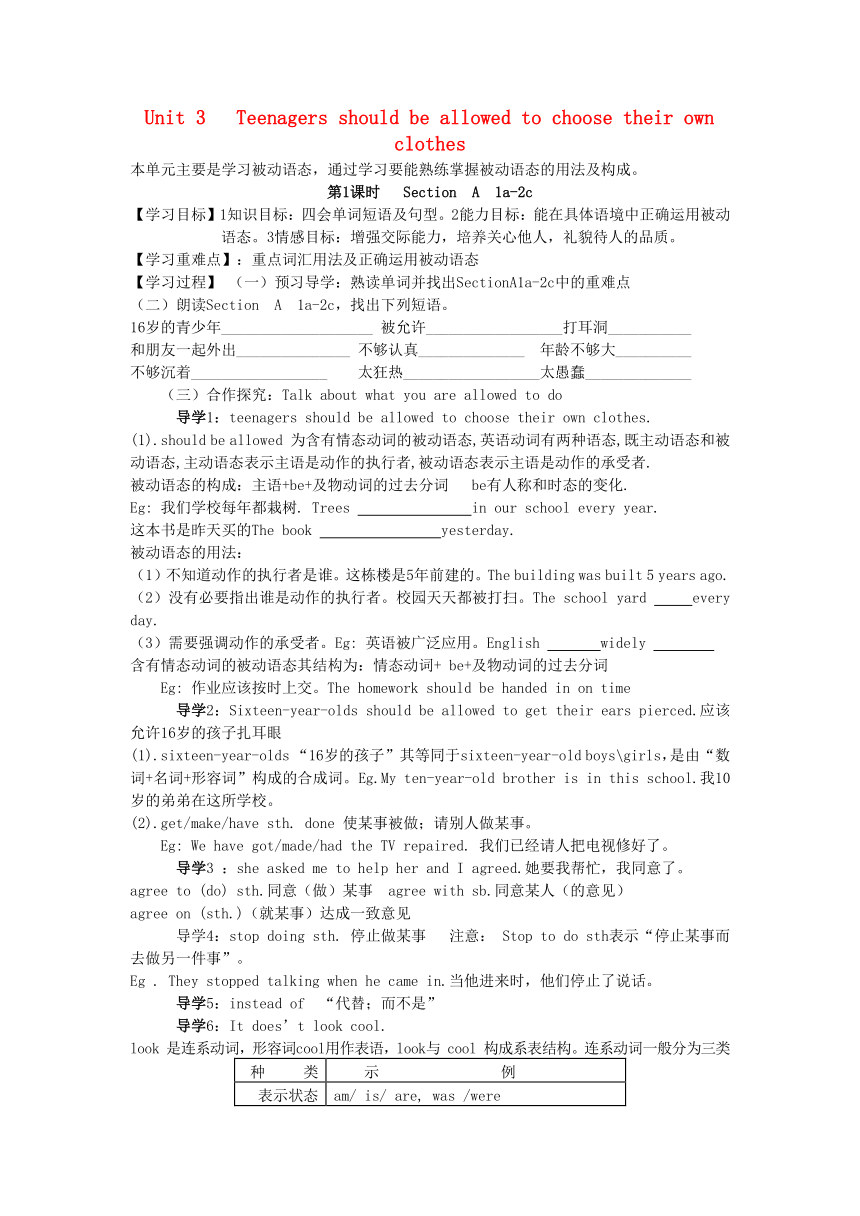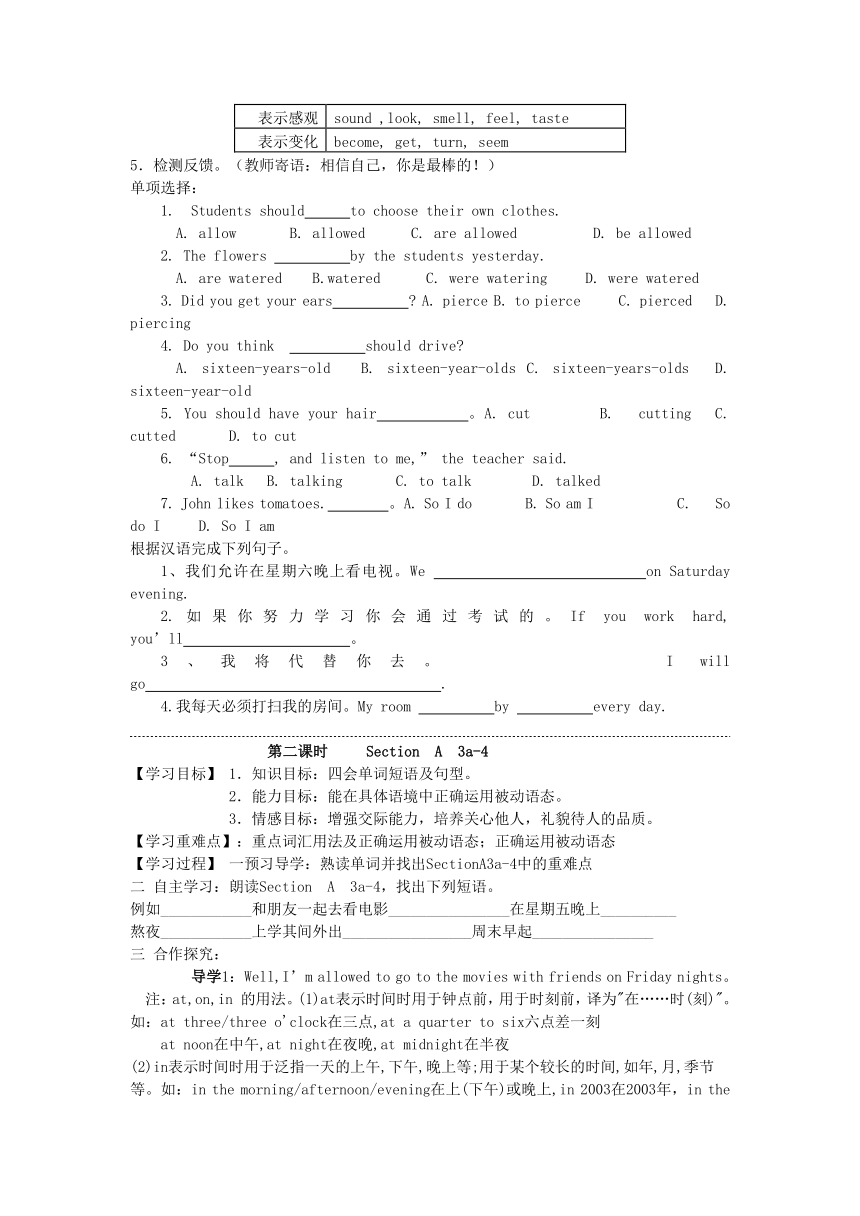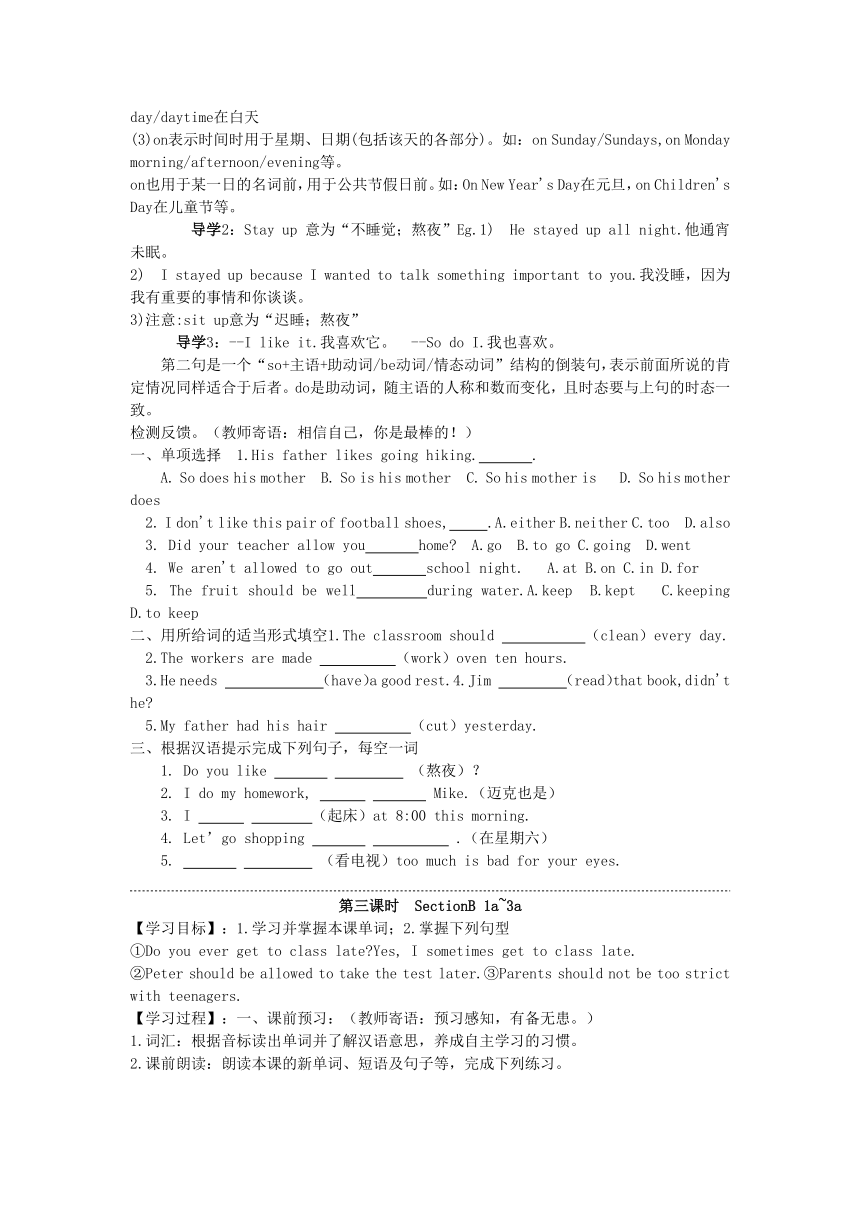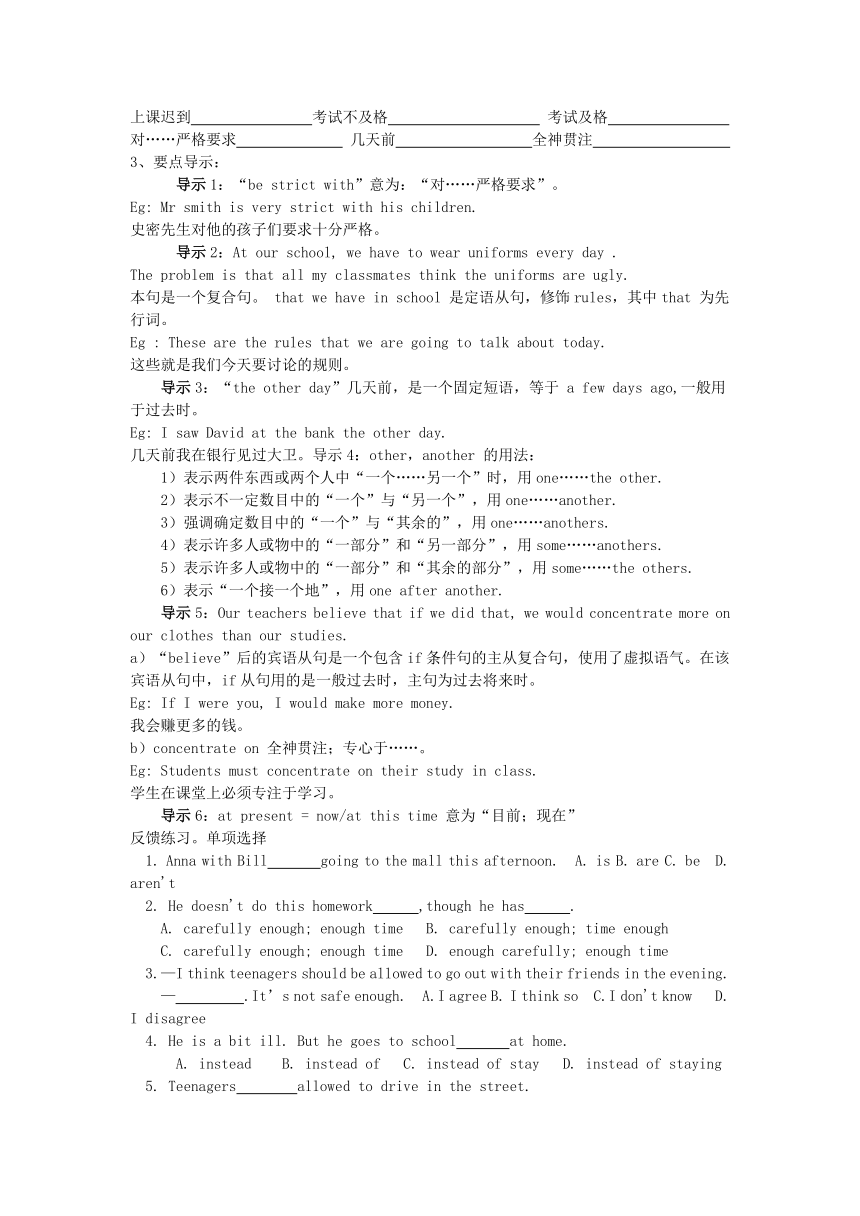Unit 3 Teenagers should be allowed to choose their own clothes.全单元导学案(5课时)
文档属性
| 名称 | Unit 3 Teenagers should be allowed to choose their own clothes.全单元导学案(5课时) |  | |
| 格式 | zip | ||
| 文件大小 | 24.5KB | ||
| 资源类型 | 教案 | ||
| 版本资源 | 人教新目标(Go for it)版 | ||
| 科目 | 英语 | ||
| 更新时间 | 2013-09-24 22:49:34 | ||
图片预览




文档简介
Unit 3 Teenagers should be allowed to choose their own clothes
本单元主要是学习被动语态,通过学习要能熟练掌握被动语态的用法及构成。
第1课时 Section A 1a-2c
【学习目标】1知识目标:四会单词短语及句型。2能力目标:能在具体语境中正确运用被动语态。3情感目标:增强交际能力,培养关心他人,礼貌待人的品质。
【学习重难点】:重点词汇用法及正确运用被动语态
【学习过程】 (一)预习导学:熟读单词并找出SectionA1a-2c中的重难点
(二)朗读Section A 1a-2c,找出下列短语。
16岁的青少年____________________ 被允许__________________打耳洞___________
和朋友一起外出_______________ 不够认真______________ 年龄不够大__________
不够沉着__________________ 太狂热__________________太愚蠢______________
(三)合作探究:Talk about what you are allowed to do
导学1:teenagers should be allowed to choose their own clothes.
(1).should be allowed 为含有情态动词的被动语态,英语动词有两种语态,既主动语态和被动语态,主动语态表示主语是动作的执行者,被动语态表示主语是动作的承受者.
被动语态的构成:主语+be+及物动词的过去分词 be有人称和时态的变化.
Eg: 我们学校每年都栽树. Trees in our school every year.
这本书是昨天买的The book yesterday.
被动语态的用法:
(1)不知道动作的执行者是谁。这栋楼是5年前建的。The building was built 5 years ago.
(2)没有必要指出谁是动作的执行者。校园天天都被打扫。The school yard every day.
(3)需要强调动作的承受者。Eg: 英语被广泛应用。English widely
含有情态动词的被动语态其结构为:情态动词+ be+及物动词的过去分词
Eg: 作业应该按时上交。The homework should be handed in on time
导学2:Sixteen-year-olds should be allowed to get their ears pierced.应该允许16岁的孩子扎耳眼
(1).sixteen-year-olds “16岁的孩子”其等同于sixteen-year-old boys\girls,是由“数词+名词+形容词”构成的合成词。Eg.My ten-year-old brother is in this school.我10岁的弟弟在这所学校。
(2).get/make/have sth. done 使某事被做;请别人做某事。
Eg: We have got/made/had the TV repaired. 我们已经请人把电视修好了。
导学3 :she asked me to help her and I agreed.她要我帮忙,我同意了。
agree to (do) sth.同意(做)某事 agree with sb.同意某人(的意见)
agree on (sth.)(就某事)达成一致意见
导学4:stop doing sth. 停止做某事 注意: Stop to do sth表示“停止某事而去做另一件事”。
Eg . They stopped talking when he came in.当他进来时,他们停止了说话。
导学5:instead of “代替;而不是”
导学6:It does’t look cool.
look 是连系动词,形容词cool用作表语,look与 cool 构成系表结构。连系动词一般分为三类
种 类 示 例
表示状态 am/ is/ are, was /were
表示感观 sound ,look, smell, feel, taste
表示变化 become, get, turn, seem
5.检测反馈。(教师寄语:相信自己,你是最棒的!)
单项选择:
1. Students should to choose their own clothes.
A. allow B. allowed C. are allowed D. be allowed
2. The flowers by the students yesterday.
A. are watered B.watered C. were watering D. were watered
3. Did you get your ears A. pierce B. to pierce C. pierced D. piercing
4. Do you think should drive
A. sixteen-years-old B. sixteen-year-olds C. sixteen-years-olds D. sixteen-year-old
5. You should have your hair 。A. cut B. cutting C. cutted D. to cut
6. “Stop , and listen to me,” the teacher said.
A. talk B. talking C. to talk D. talked
7. John likes tomatoes. 。A. So I do B. So am I C. So do I D. So I am
根据汉语完成下列句子。
1、我们允许在星期六晚上看电视。We on Saturday evening.
2.如果你努力学习你会通过考试的。If you work hard, you’ll 。
3、我将代替你去。 I will go .
4.我每天必须打扫我的房间。My room by every day.
第二课时 Section A 3a-4
【学习目标】 1.知识目标:四会单词短语及句型。
2.能力目标:能在具体语境中正确运用被动语态。
3.情感目标:增强交际能力,培养关心他人,礼貌待人的品质。
【学习重难点】:重点词汇用法及正确运用被动语态;正确运用被动语态
【学习过程】 一预习导学:熟读单词并找出SectionA3a-4中的重难点
二 自主学习:朗读Section A 3a-4,找出下列短语。
例如____________和朋友一起去看电影________________在星期五晚上__________
熬夜____________上学其间外出_________________周末早起________________
三 合作探究:
导学1:Well,I’m allowed to go to the movies with friends on Friday nights。
注:at,on,in 的用法。(1)at表示时间时用于钟点前,用于时刻前,译为"在……时(刻)"。如:at three/three o'clock在三点,at a quarter to six六点差一刻
at noon在中午,at night在夜晚,at midnight在半夜
(2)in表示时间时用于泛指一天的上午,下午,晚上等;用于某个较长的时间,如年,月,季节等。如:in the morning/afternoon/evening在上(下午)或晚上,in 2003在2003年,in the day/daytime在白天
(3)on表示时间时用于星期、日期(包括该天的各部分)。如:on Sunday/Sundays,on Monday morning/afternoon/evening等。
on也用于某一日的名词前,用于公共节假日前。如:On New Year's Day在元旦,on Children's Day在儿童节等。
导学2:Stay up 意为“不睡觉;熬夜”Eg.1) He stayed up all night.他通宵未眠。
2) I stayed up because I wanted to talk something important to you.我没睡,因为我有重要的事情和你谈谈。
3)注意:sit up意为“迟睡;熬夜”
导学3:--I like it.我喜欢它。 --So do I.我也喜欢。
第二句是一个“so+主语+助动词/be动词/情态动词”结构的倒装句,表示前面所说的肯定情况同样适合于后者。do是助动词,随主语的人称和数而变化,且时态要与上句的时态一致。
检测反馈。(教师寄语:相信自己,你是最棒的!)
一、单项选择 1.His father likes going hiking. .
A. So does his mother B. So is his mother C. So his mother is D. So his mother does
2. I don't like this pair of football shoes, .A.either B.neither C.too D.also
3. Did your teacher allow you home A.go B.to go C.going D.went
4. We aren't allowed to go out school night. A.at B.on C.in D.for
5. The fruit should be well during water.A.keep B.kept C.keeping D.to keep
二、用所给词的适当形式填空1.The classroom should (clean)every day.
2.The workers are made (work)oven ten hours.
3.He needs (have)a good rest.4.Jim (read)that book,didn't he
5.My father had his hair (cut)yesterday.
三、根据汉语提示完成下列句子,每空一词
1. Do you like (熬夜)?
2. I do my homework, Mike.(迈克也是)
3. I (起床)at 8:00 this morning.
4. Let’go shopping .(在星期六)
5. (看电视)too much is bad for your eyes.
第三课时 SectionB 1a~3a
【学习目标】:1.学习并掌握本课单词;2.掌握下列句型
①Do you ever get to class late Yes, I sometimes get to class late.
②Peter should be allowed to take the test later.③Parents should not be too strict with teenagers.
【学习过程】:一、课前预习:(教师寄语:预习感知,有备无患。)
1.词汇:根据音标读出单词并了解汉语意思,养成自主学习的习惯。
2.课前朗读:朗读本课的新单词、短语及句子等,完成下列练习。
上课迟到 考试不及格 考试及格 对……严格要求 几天前 全神贯注
3、要点导示:
导示1:“be strict with”意为:“对……严格要求”。
Eg: Mr smith is very strict with his children.
史密先生对他的孩子们要求十分严格。
导示2:At our school, we have to wear uniforms every day .
The problem is that all my classmates think the uniforms are ugly.
本句是一个复合句。 that we have in school 是定语从句,修饰rules,其中that 为先行词。
Eg : These are the rules that we are going to talk about today.
这些就是我们今天要讨论的规则。
导示3:“the other day”几天前,是一个固定短语,等于 a few days ago,一般用于过去时。
Eg: I saw David at the bank the other day.
几天前我在银行见过大卫。导示4:other,another 的用法:
1)表示两件东西或两个人中“一个……另一个”时,用one……the other.
2)表示不一定数目中的“一个”与“另一个”,用one……another.
3)强调确定数目中的“一个”与“其余的”,用one……anothers.
4)表示许多人或物中的“一部分”和“另一部分”,用some……anothers.
5)表示许多人或物中的“一部分”和“其余的部分”,用some……the others.
6)表示“一个接一个地”,用one after another.
导示5:Our teachers believe that if we did that, we would concentrate more on our clothes than our studies.
a)“believe”后的宾语从句是一个包含if条件句的主从复合句,使用了虚拟语气。在该宾语从句中,if从句用的是一般过去时,主句为过去将来时。
Eg: If I were you, I would make more money.
我会赚更多的钱。
b)concentrate on 全神贯注;专心于……。
Eg: Students must concentrate on their study in class.
学生在课堂上必须专注于学习。
导示6:at present = now/at this time 意为“目前;现在”
反馈练习。单项选择
1. Anna with Bill going to the mall this afternoon. A. is B. are C. be D. aren't
2. He doesn't do this homework ,though he has .
A. carefully enough; enough time B. carefully enough; time enough
C. carefully enough; enough time D. enough carefully; enough time
3.—I think teenagers should be allowed to go out with their friends in the evening.
— .It’s not safe enough. A.I agree B. I think so C.I don't know D. I disagree
4. He is a bit ill. But he goes to school at home.
A. instead B. instead of C. instead of stay D. instead of staying
5. Teenagers allowed to drive in the street.
A. should not be B. should be not C. not should be D. should not
(二)根据句意及首字母提示完成下列句子
1. He looked unhappy because he f the exam.
2. He always w about his mother’s health.
3. W is the fourth day of a week.
4. Would you mind c up your room
5. Peter should be allowed to t the test.
(三)根据汉语提示完成下列句子,每空一词
1.我们应该对孩子严格要求。 We should our children.
2.如果他努力的话他会考试及格的。He’ll the exam if he hard.
3.他经常上学迟到。 He is often school.
4.莉莉不得不呆在家里照顾她弟弟。Lily stay at home and look his brother.
5.早起对身体有好处。 is good for health.
第四课时 SectionB 3a~selfcheck
【学习目标】:1.学习并掌握本课单词;2.掌握下列句型
①What school rules do you think should be changed
Well, I think we should be allowed to wear our own clothes.
②We would feel more comfortable and that is good for studying.
【学习过程】:一、课前预习:(教师寄语:预习感知,有备无患。)
课前朗读:朗读本课的新单词、短语及句子等,完成下列练习。
对……有好处 如果需要的话 不得不,必须
打扫 英英字典 一条牛仔裤
要点导示:
导示1:“be good for ”意为:“对……有好处”,后接名词、代词或V-ing形式。
Eg: Drink it up. It’ll be good for you.
be good for 对……有益 be bad for 对……有害 be good at 擅长……
导示2:“If necessary”意为“如果需要的话”。
Eg : If necessary, we shall send a telegram home.如果有必要,我们就往永里发电报。
“Whenever possible”意为“一有可能”。
Eg: Whenever possible, he will come to help me.他一有可能就来帮助我。
导示3:“have to ”意为“不得不,必须”。Eg: We have to do our homework.我们不得不做作业。
“have to”在表示“必须”这个意义时,强调客观需要,否定形式,don't have to(没必要),常用来回答must引导的一般问句。
Eg :—Must I come back in ten minutes 我必须在十分钟内回来吗?
—No, you don't have to.不,没有必要。
“have to”与“must”的区别:
①强调客观需要,有人称,数和时态的变化,其否定形式don't have to 表示“不必”。
②强调主观必需,无人称,数和时态的变化,其否定形式mustn't 表示“禁止”。
导示4:“mess”意为“脏乱;混乱”,是名词。
Eg:①The kitchen is a mess.厨房太脏了。
②Get cleaned up! You're a mess! 赶紧收拾一下吧!你多脏呀!
导示5:Which pair of jeans to buy 是“疑问句+动词不定式”结构,在句中作宾语。
Eg: These jackets are all very beautiful. I really don't know which one to buy.
这些夹克都很漂亮,我真不知道买哪件。
英语中还有一些疑问句可以用在这些结构中,如Who, What, When, Where, how等。“疑问句+动词不定式”结构在句中可以作主语、宾语或表语等成份。
反馈练习。(一)单项选择
1.It’s a good way keep yourself.
A. To; health B./;healthy C./;health D. to; healthy
2. We should learn each other. A. to B. for C. of D. from
3. Would you like the uniforms which were designed by yourselves
A. to wear B. to dress C. wearing D. dressing
4. They won’t concentrate their clothes than their studies.
A. mote about B. less on C. more on D. less about
5.—Our teacher is too strict us. —I agree with you. But she is also friendly us.
A. with; to B.to; with C. for; to D. with; for
(二)根据句意及首字母提示完成下列句子
1. He is a m of our school English club, 2.Visiting Beijing is good e for us.
3. You will feel more c if you have a soft seat.
4. It’s also p a good idea for us to study in groups.
5. Don’t miss this o . It may never come again.
(三)用所给词的适当形式填空1.That’s a good way (keep)them happy.
2.Keeping practicing is good for (improve)my English.
3.Mr Brown will go fishing if it (not rain)tomorrow.
4.Do you often volunteer (help)your neighbor
5.What school rules do you think should (change)
第五课时 Reading
语言点
导学1. ____________________________________.但有时这些爱好会妨碍学习。
get in the way ( of ) ____________, get in one’s way ____________.
1)她的社会生活妨碍了她的学习Her social life _____ _______ _______ ______ ______ study.
2)河流挡了他们上学的路。 The river _______ ________ ________ ________ to school.
2. ---___________________________________________.我知道我父母关心我。
辨析:care about, care for, take care, take care of
< 1 > care about ________; ________; ________,
其后常接________, ________, ________,一般用于否定句或疑问句中。
1.那个小姑娘从不在乎别人。 The girl never ________ ________ others.
< 2 > care for ________;________。 作“喜欢”讲时,常用于否定句或疑问句。
2.我真的不喜欢饮料。 I don’t really ________ ________ drinks.
< 3 > take care ________,________。其后接to do 或 that 从句,相当于____________。
3.当心别迷路。 ________ ________ not to get lost.
4.小心!太危险! ________ _______! It’s too dangerous!
< 4 > take care of ________;________。相当于 _______________
5.孩子们应当受到很好的照顾。Children should be ________ ________ _______ ________.
6.我们应该爱护动物。 We should ________ ________ ________ animals.
当堂达标检测
一、.根据首字母提示完成单词,使句意完整
1. He n________ to spend time with friends.
2. He has rich e________ in teaching English.
3. In our school we should wear u________ every day.
4. I stayed up very late yesterday, so I feel very s________ now.
5. I can’t c________ on my studies with all that noise going on.
6. You don’t know the i______ of the task.
7. Who can r_____ to this question Please hands up.
8. You will have many o_______ to go abroad.
9. They’ll have a week o_____ next month.
10. We are busy working on our project at p________.
二、单项选择1. Mr Green is strict not only _____ his students but also _____ their studies.
A. in, in B. with, with C. with, in D. in, with
2. Children should _____ get on well with _____.
A. teach how they, others B. teach how to, another
C. be taught how to, others D. taught to, the others
3. She doesn’t know which pair of jeans to buy, both of them look _____ her.
A. well on B. nice on C. good at D. beautiful with
4. Young students should _____.
A. taken good care B. be taken good care of C. take good care of D. well look after
5. As a student, you need at least _____ sleep a day.
A. eight-hours B. eight hour’s C. eight hours’ D. eight hours
6. —Next week you will take your exams. I think you should get all your lesson ___ this week. —Ok, I will.
A. review B. to review C. reviewing D. reviewed
7. If you want to speak English better, you should practice _____ possible.
A. as many as B. as much as C. so more as D. as well as
8. Stop polluting to keep the environment _____.
A. cleaning B. cleaned C. clean D. to clean
9. They didn’t _____ until 10:00 last night.
A. go to bed B. fall asleep C. be sleepy D. go to sleep
10. We should feel more comfortable and that is _____ studying.
A. good at B. good for C. do well in D. good to
三、完成句子1.我们为老人们唱歌演戏。We _____ _______ and ______ ______ the old people.
2.只有那时我将才有机会实现我的梦想。Only then _____ I ____ a ____ of ____ my dream.
3. 这些坏习惯可能会妨碍你的学习。
These bad habits may ______ ______ ______ ___ ______your schoolwork.
4. 我们应该更经常被允许像那样花时间做事。
We should be allowed _______ ______ _____ _____ _____ things like that _____ _____
5. 我知道有时我们会很吵,但我们也相互学会了很多东西。
I know we ______ ______ sometimes, but we ______ a lot ____________ ______.
本单元主要是学习被动语态,通过学习要能熟练掌握被动语态的用法及构成。
第1课时 Section A 1a-2c
【学习目标】1知识目标:四会单词短语及句型。2能力目标:能在具体语境中正确运用被动语态。3情感目标:增强交际能力,培养关心他人,礼貌待人的品质。
【学习重难点】:重点词汇用法及正确运用被动语态
【学习过程】 (一)预习导学:熟读单词并找出SectionA1a-2c中的重难点
(二)朗读Section A 1a-2c,找出下列短语。
16岁的青少年____________________ 被允许__________________打耳洞___________
和朋友一起外出_______________ 不够认真______________ 年龄不够大__________
不够沉着__________________ 太狂热__________________太愚蠢______________
(三)合作探究:Talk about what you are allowed to do
导学1:teenagers should be allowed to choose their own clothes.
(1).should be allowed 为含有情态动词的被动语态,英语动词有两种语态,既主动语态和被动语态,主动语态表示主语是动作的执行者,被动语态表示主语是动作的承受者.
被动语态的构成:主语+be+及物动词的过去分词 be有人称和时态的变化.
Eg: 我们学校每年都栽树. Trees in our school every year.
这本书是昨天买的The book yesterday.
被动语态的用法:
(1)不知道动作的执行者是谁。这栋楼是5年前建的。The building was built 5 years ago.
(2)没有必要指出谁是动作的执行者。校园天天都被打扫。The school yard every day.
(3)需要强调动作的承受者。Eg: 英语被广泛应用。English widely
含有情态动词的被动语态其结构为:情态动词+ be+及物动词的过去分词
Eg: 作业应该按时上交。The homework should be handed in on time
导学2:Sixteen-year-olds should be allowed to get their ears pierced.应该允许16岁的孩子扎耳眼
(1).sixteen-year-olds “16岁的孩子”其等同于sixteen-year-old boys\girls,是由“数词+名词+形容词”构成的合成词。Eg.My ten-year-old brother is in this school.我10岁的弟弟在这所学校。
(2).get/make/have sth. done 使某事被做;请别人做某事。
Eg: We have got/made/had the TV repaired. 我们已经请人把电视修好了。
导学3 :she asked me to help her and I agreed.她要我帮忙,我同意了。
agree to (do) sth.同意(做)某事 agree with sb.同意某人(的意见)
agree on (sth.)(就某事)达成一致意见
导学4:stop doing sth. 停止做某事 注意: Stop to do sth表示“停止某事而去做另一件事”。
Eg . They stopped talking when he came in.当他进来时,他们停止了说话。
导学5:instead of “代替;而不是”
导学6:It does’t look cool.
look 是连系动词,形容词cool用作表语,look与 cool 构成系表结构。连系动词一般分为三类
种 类 示 例
表示状态 am/ is/ are, was /were
表示感观 sound ,look, smell, feel, taste
表示变化 become, get, turn, seem
5.检测反馈。(教师寄语:相信自己,你是最棒的!)
单项选择:
1. Students should to choose their own clothes.
A. allow B. allowed C. are allowed D. be allowed
2. The flowers by the students yesterday.
A. are watered B.watered C. were watering D. were watered
3. Did you get your ears A. pierce B. to pierce C. pierced D. piercing
4. Do you think should drive
A. sixteen-years-old B. sixteen-year-olds C. sixteen-years-olds D. sixteen-year-old
5. You should have your hair 。A. cut B. cutting C. cutted D. to cut
6. “Stop , and listen to me,” the teacher said.
A. talk B. talking C. to talk D. talked
7. John likes tomatoes. 。A. So I do B. So am I C. So do I D. So I am
根据汉语完成下列句子。
1、我们允许在星期六晚上看电视。We on Saturday evening.
2.如果你努力学习你会通过考试的。If you work hard, you’ll 。
3、我将代替你去。 I will go .
4.我每天必须打扫我的房间。My room by every day.
第二课时 Section A 3a-4
【学习目标】 1.知识目标:四会单词短语及句型。
2.能力目标:能在具体语境中正确运用被动语态。
3.情感目标:增强交际能力,培养关心他人,礼貌待人的品质。
【学习重难点】:重点词汇用法及正确运用被动语态;正确运用被动语态
【学习过程】 一预习导学:熟读单词并找出SectionA3a-4中的重难点
二 自主学习:朗读Section A 3a-4,找出下列短语。
例如____________和朋友一起去看电影________________在星期五晚上__________
熬夜____________上学其间外出_________________周末早起________________
三 合作探究:
导学1:Well,I’m allowed to go to the movies with friends on Friday nights。
注:at,on,in 的用法。(1)at表示时间时用于钟点前,用于时刻前,译为"在……时(刻)"。如:at three/three o'clock在三点,at a quarter to six六点差一刻
at noon在中午,at night在夜晚,at midnight在半夜
(2)in表示时间时用于泛指一天的上午,下午,晚上等;用于某个较长的时间,如年,月,季节等。如:in the morning/afternoon/evening在上(下午)或晚上,in 2003在2003年,in the day/daytime在白天
(3)on表示时间时用于星期、日期(包括该天的各部分)。如:on Sunday/Sundays,on Monday morning/afternoon/evening等。
on也用于某一日的名词前,用于公共节假日前。如:On New Year's Day在元旦,on Children's Day在儿童节等。
导学2:Stay up 意为“不睡觉;熬夜”Eg.1) He stayed up all night.他通宵未眠。
2) I stayed up because I wanted to talk something important to you.我没睡,因为我有重要的事情和你谈谈。
3)注意:sit up意为“迟睡;熬夜”
导学3:--I like it.我喜欢它。 --So do I.我也喜欢。
第二句是一个“so+主语+助动词/be动词/情态动词”结构的倒装句,表示前面所说的肯定情况同样适合于后者。do是助动词,随主语的人称和数而变化,且时态要与上句的时态一致。
检测反馈。(教师寄语:相信自己,你是最棒的!)
一、单项选择 1.His father likes going hiking. .
A. So does his mother B. So is his mother C. So his mother is D. So his mother does
2. I don't like this pair of football shoes, .A.either B.neither C.too D.also
3. Did your teacher allow you home A.go B.to go C.going D.went
4. We aren't allowed to go out school night. A.at B.on C.in D.for
5. The fruit should be well during water.A.keep B.kept C.keeping D.to keep
二、用所给词的适当形式填空1.The classroom should (clean)every day.
2.The workers are made (work)oven ten hours.
3.He needs (have)a good rest.4.Jim (read)that book,didn't he
5.My father had his hair (cut)yesterday.
三、根据汉语提示完成下列句子,每空一词
1. Do you like (熬夜)?
2. I do my homework, Mike.(迈克也是)
3. I (起床)at 8:00 this morning.
4. Let’go shopping .(在星期六)
5. (看电视)too much is bad for your eyes.
第三课时 SectionB 1a~3a
【学习目标】:1.学习并掌握本课单词;2.掌握下列句型
①Do you ever get to class late Yes, I sometimes get to class late.
②Peter should be allowed to take the test later.③Parents should not be too strict with teenagers.
【学习过程】:一、课前预习:(教师寄语:预习感知,有备无患。)
1.词汇:根据音标读出单词并了解汉语意思,养成自主学习的习惯。
2.课前朗读:朗读本课的新单词、短语及句子等,完成下列练习。
上课迟到 考试不及格 考试及格 对……严格要求 几天前 全神贯注
3、要点导示:
导示1:“be strict with”意为:“对……严格要求”。
Eg: Mr smith is very strict with his children.
史密先生对他的孩子们要求十分严格。
导示2:At our school, we have to wear uniforms every day .
The problem is that all my classmates think the uniforms are ugly.
本句是一个复合句。 that we have in school 是定语从句,修饰rules,其中that 为先行词。
Eg : These are the rules that we are going to talk about today.
这些就是我们今天要讨论的规则。
导示3:“the other day”几天前,是一个固定短语,等于 a few days ago,一般用于过去时。
Eg: I saw David at the bank the other day.
几天前我在银行见过大卫。导示4:other,another 的用法:
1)表示两件东西或两个人中“一个……另一个”时,用one……the other.
2)表示不一定数目中的“一个”与“另一个”,用one……another.
3)强调确定数目中的“一个”与“其余的”,用one……anothers.
4)表示许多人或物中的“一部分”和“另一部分”,用some……anothers.
5)表示许多人或物中的“一部分”和“其余的部分”,用some……the others.
6)表示“一个接一个地”,用one after another.
导示5:Our teachers believe that if we did that, we would concentrate more on our clothes than our studies.
a)“believe”后的宾语从句是一个包含if条件句的主从复合句,使用了虚拟语气。在该宾语从句中,if从句用的是一般过去时,主句为过去将来时。
Eg: If I were you, I would make more money.
我会赚更多的钱。
b)concentrate on 全神贯注;专心于……。
Eg: Students must concentrate on their study in class.
学生在课堂上必须专注于学习。
导示6:at present = now/at this time 意为“目前;现在”
反馈练习。单项选择
1. Anna with Bill going to the mall this afternoon. A. is B. are C. be D. aren't
2. He doesn't do this homework ,though he has .
A. carefully enough; enough time B. carefully enough; time enough
C. carefully enough; enough time D. enough carefully; enough time
3.—I think teenagers should be allowed to go out with their friends in the evening.
— .It’s not safe enough. A.I agree B. I think so C.I don't know D. I disagree
4. He is a bit ill. But he goes to school at home.
A. instead B. instead of C. instead of stay D. instead of staying
5. Teenagers allowed to drive in the street.
A. should not be B. should be not C. not should be D. should not
(二)根据句意及首字母提示完成下列句子
1. He looked unhappy because he f the exam.
2. He always w about his mother’s health.
3. W is the fourth day of a week.
4. Would you mind c up your room
5. Peter should be allowed to t the test.
(三)根据汉语提示完成下列句子,每空一词
1.我们应该对孩子严格要求。 We should our children.
2.如果他努力的话他会考试及格的。He’ll the exam if he hard.
3.他经常上学迟到。 He is often school.
4.莉莉不得不呆在家里照顾她弟弟。Lily stay at home and look his brother.
5.早起对身体有好处。 is good for health.
第四课时 SectionB 3a~selfcheck
【学习目标】:1.学习并掌握本课单词;2.掌握下列句型
①What school rules do you think should be changed
Well, I think we should be allowed to wear our own clothes.
②We would feel more comfortable and that is good for studying.
【学习过程】:一、课前预习:(教师寄语:预习感知,有备无患。)
课前朗读:朗读本课的新单词、短语及句子等,完成下列练习。
对……有好处 如果需要的话 不得不,必须
打扫 英英字典 一条牛仔裤
要点导示:
导示1:“be good for ”意为:“对……有好处”,后接名词、代词或V-ing形式。
Eg: Drink it up. It’ll be good for you.
be good for 对……有益 be bad for 对……有害 be good at 擅长……
导示2:“If necessary”意为“如果需要的话”。
Eg : If necessary, we shall send a telegram home.如果有必要,我们就往永里发电报。
“Whenever possible”意为“一有可能”。
Eg: Whenever possible, he will come to help me.他一有可能就来帮助我。
导示3:“have to ”意为“不得不,必须”。Eg: We have to do our homework.我们不得不做作业。
“have to”在表示“必须”这个意义时,强调客观需要,否定形式,don't have to(没必要),常用来回答must引导的一般问句。
Eg :—Must I come back in ten minutes 我必须在十分钟内回来吗?
—No, you don't have to.不,没有必要。
“have to”与“must”的区别:
①强调客观需要,有人称,数和时态的变化,其否定形式don't have to 表示“不必”。
②强调主观必需,无人称,数和时态的变化,其否定形式mustn't 表示“禁止”。
导示4:“mess”意为“脏乱;混乱”,是名词。
Eg:①The kitchen is a mess.厨房太脏了。
②Get cleaned up! You're a mess! 赶紧收拾一下吧!你多脏呀!
导示5:Which pair of jeans to buy 是“疑问句+动词不定式”结构,在句中作宾语。
Eg: These jackets are all very beautiful. I really don't know which one to buy.
这些夹克都很漂亮,我真不知道买哪件。
英语中还有一些疑问句可以用在这些结构中,如Who, What, When, Where, how等。“疑问句+动词不定式”结构在句中可以作主语、宾语或表语等成份。
反馈练习。(一)单项选择
1.It’s a good way keep yourself.
A. To; health B./;healthy C./;health D. to; healthy
2. We should learn each other. A. to B. for C. of D. from
3. Would you like the uniforms which were designed by yourselves
A. to wear B. to dress C. wearing D. dressing
4. They won’t concentrate their clothes than their studies.
A. mote about B. less on C. more on D. less about
5.—Our teacher is too strict us. —I agree with you. But she is also friendly us.
A. with; to B.to; with C. for; to D. with; for
(二)根据句意及首字母提示完成下列句子
1. He is a m of our school English club, 2.Visiting Beijing is good e for us.
3. You will feel more c if you have a soft seat.
4. It’s also p a good idea for us to study in groups.
5. Don’t miss this o . It may never come again.
(三)用所给词的适当形式填空1.That’s a good way (keep)them happy.
2.Keeping practicing is good for (improve)my English.
3.Mr Brown will go fishing if it (not rain)tomorrow.
4.Do you often volunteer (help)your neighbor
5.What school rules do you think should (change)
第五课时 Reading
语言点
导学1. ____________________________________.但有时这些爱好会妨碍学习。
get in the way ( of ) ____________, get in one’s way ____________.
1)她的社会生活妨碍了她的学习Her social life _____ _______ _______ ______ ______ study.
2)河流挡了他们上学的路。 The river _______ ________ ________ ________ to school.
2. ---___________________________________________.我知道我父母关心我。
辨析:care about, care for, take care, take care of
< 1 > care about ________; ________; ________,
其后常接________, ________, ________,一般用于否定句或疑问句中。
1.那个小姑娘从不在乎别人。 The girl never ________ ________ others.
< 2 > care for ________;________。 作“喜欢”讲时,常用于否定句或疑问句。
2.我真的不喜欢饮料。 I don’t really ________ ________ drinks.
< 3 > take care ________,________。其后接to do 或 that 从句,相当于____________。
3.当心别迷路。 ________ ________ not to get lost.
4.小心!太危险! ________ _______! It’s too dangerous!
< 4 > take care of ________;________。相当于 _______________
5.孩子们应当受到很好的照顾。Children should be ________ ________ _______ ________.
6.我们应该爱护动物。 We should ________ ________ ________ animals.
当堂达标检测
一、.根据首字母提示完成单词,使句意完整
1. He n________ to spend time with friends.
2. He has rich e________ in teaching English.
3. In our school we should wear u________ every day.
4. I stayed up very late yesterday, so I feel very s________ now.
5. I can’t c________ on my studies with all that noise going on.
6. You don’t know the i______ of the task.
7. Who can r_____ to this question Please hands up.
8. You will have many o_______ to go abroad.
9. They’ll have a week o_____ next month.
10. We are busy working on our project at p________.
二、单项选择1. Mr Green is strict not only _____ his students but also _____ their studies.
A. in, in B. with, with C. with, in D. in, with
2. Children should _____ get on well with _____.
A. teach how they, others B. teach how to, another
C. be taught how to, others D. taught to, the others
3. She doesn’t know which pair of jeans to buy, both of them look _____ her.
A. well on B. nice on C. good at D. beautiful with
4. Young students should _____.
A. taken good care B. be taken good care of C. take good care of D. well look after
5. As a student, you need at least _____ sleep a day.
A. eight-hours B. eight hour’s C. eight hours’ D. eight hours
6. —Next week you will take your exams. I think you should get all your lesson ___ this week. —Ok, I will.
A. review B. to review C. reviewing D. reviewed
7. If you want to speak English better, you should practice _____ possible.
A. as many as B. as much as C. so more as D. as well as
8. Stop polluting to keep the environment _____.
A. cleaning B. cleaned C. clean D. to clean
9. They didn’t _____ until 10:00 last night.
A. go to bed B. fall asleep C. be sleepy D. go to sleep
10. We should feel more comfortable and that is _____ studying.
A. good at B. good for C. do well in D. good to
三、完成句子1.我们为老人们唱歌演戏。We _____ _______ and ______ ______ the old people.
2.只有那时我将才有机会实现我的梦想。Only then _____ I ____ a ____ of ____ my dream.
3. 这些坏习惯可能会妨碍你的学习。
These bad habits may ______ ______ ______ ___ ______your schoolwork.
4. 我们应该更经常被允许像那样花时间做事。
We should be allowed _______ ______ _____ _____ _____ things like that _____ _____
5. 我知道有时我们会很吵,但我们也相互学会了很多东西。
I know we ______ ______ sometimes, but we ______ a lot ____________ ______.
同课章节目录
- Unit 1 How can we become good learners.
- Section A
- Section B
- Unit 2 I think that mooncakes are delicious!
- Section A
- Section B
- Unit 3 Could you please tell me where the restroom
- Section A
- Section B
- Unit 4 I used to be afraid of the dark.
- Section A
- Section B
- Unit 5 What are the shirts made of?
- Section A
- Section B
- Review of Units 1-5
- Unit 6 When was it invented?
- Section A
- Section B
- Unit 7 Teenagers should be allowed to choose their
- Section A
- Section B
- Unit 8 It must belong to Carla.
- Section A
- Section B
- Unit 9 I like music that I can dance to.
- Section A
- Section B
- Unit 10 You're supposed to shake hands.
- Section A
- Section B
- Review of Units 6-10
- Unit 11 Sad movies make me cry.
- Section A
- Section B
- Unit 12 Life is full of the unexpected
- Section A
- Section B
- Unit 13 We're trying to save the earth!
- Section A
- Section B
- Unit 14 I remember meeting all of you in Grade 7.
- Section A
- Section B
- Review of Units 11-14
